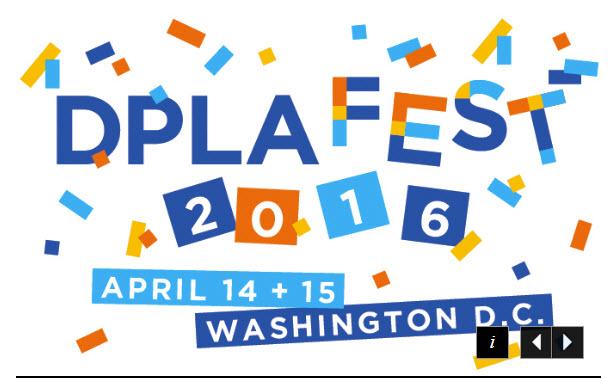Quick Summary
April 14th-15th marked the 2016 DPLAfest held in Washington D.C. I attended sessions at various locations such as the Library of Congress - Jefferson and Madison Buildings, The National Archives, and The Smithsonian Ripley Center. Highlights included getting clarity on copyright from RightsStatements.org, a panel session on the future of libraries, and information about DPLA's rollout of the collaborative Primary Source Sets project.

April 14th-15th marked the 2016 DPLAFest held in Washington D.C. I attended sessions at various locations such as the Library of Congress - Jefferson and Madison Buildings, The National Archives, and The Smithsonian Ripley Center. One highlight included getting clarity on copyright from RightsStatements.org, a partnership with Creative Commons, Kennisland and key stakeholders of DPLA and Europeana. RightsStatements.org is a collaborative approach to rights statements with the intent for use to communicate copyright status of cultural items and objects. Basically, three categories of rights statements now exist: statements for works in copyright; statements for works that are not in copyright; and statements for works where copyright status is unclear. These statements provide clear, easy to understand information about the copyright and re-use status of digital objects. They were designed with both human users and machine users (such as search engines) in mind, published as a linked data vocabulary. In addition, each statement has its own Uniform Resource Identifier (URI). Summer of 2016 marks when DPLA plans to implement these rights statements. The Minnesota Digital Library Governance group will be reviewing and discussing the statements and implementation in Minnesota.
Another highlight session was The Future of Libraries session where some data and library heavyweights shared perspectives via panel presentations including: Lee Rainie, Director of Internet, Science and Technology Research at Pew Research Center; Richard Reyes-Gavilan, Executive Director of DC Public Library; and Roberta Shaffer, Law Librarian of Congress, Library of Congress. These three individuals shared perspectives on the Future of Libraries from their very different roles in library research, public libraries, and the Library of Congress. Rainie's perspective stems from his research data on the use and impact of the internet and mobile connectivity. Reyes-Gavilan in his role as Executive Director of DCPL manages over 600 employees whom welcome more than 4.2 million people to DC's public libraries (a number exceeding the combined home attendance of Washington D.C.’s professional sports teams), and implementing a capitol improvement plan with a budget of 300 million over the next six years. Shaffer's input and perspective stem from a diverse library/technology background spanning nearly 40 years including government, academic, business, and non-profit sectors.
Lastly, DPLA's Education Advisory Committee rolled out their collaborative Primary Source Sets project, going live with it this winter. During this session, DPLA staff and collaborators shared the project's goals and progress, curation and design processes as well as lessons learned from use of the Primary Source Sets. Future directions for growing the Primary Source Sets were also shared along with some specific examples of how educators were using the sets. Interesting usage statistics were shared from use of Google Analytics, for example, 41% of traffic to DPLA Primary Source Sets came from Google searches. The presenters did a thorough job of articulating the collaborative project from goals and progress to marketing strategy. Minitex and Minnesota Digital Library staff are replicating a similar Primary Source Sets project using content from Minnesota Reflections, and information from this session will be beneficial in the implementation process.



